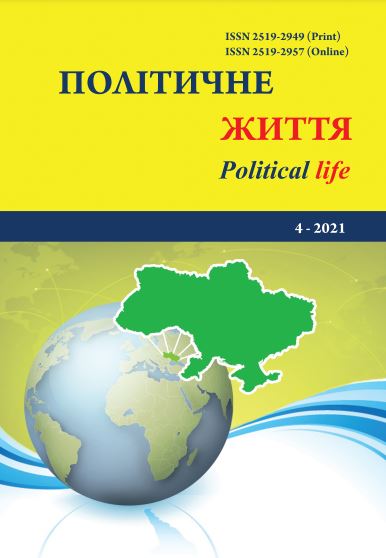Особливості забезпечення безпеки суб’єктів конкурентної розвідки в умовах загострення політичної ситуації в Республіці Білорусь
DOI:
https://doi.org/10.31558/2519-2949.2021.4.11Ключові слова:
популізм; ідеологія; політичний режим Республіки Білорусь; Комітет державної безпеки Республіки Білорусь; Федеральна служба безпеки Російської Федерації; авторитаризм; демократія; опозиція; референдум; конкурентна розвідкаАнотація
У ході проведеного дослідження авторами статті доведено, що сучасний політичний режим в Республіці Білорусь можна впевнено визначити як авторитарно-популістський. Це підтверджують останні події, які відбуваються як на території Республіки, так і за її межами. Характер цих подій опосередковано вказує на їх прямий зв’язок з діяльністю білоруських спецслужб. Зокрема простежується вплив Комітету державної безпеки Республіки Білорусь (КДБ РБ) на сфери політичного життя в країні. Зафіксовано неодноразові випадки, коли КДБ РБ намагається впливати на білоруську опозицію за кордоном.
Дослідження показали, що КДБ РБ після розпаду Радянського Союзу на відміну від інших спецслужб на пострадянському просторі уникнув суттєвих демократичних змін, зокрема залишився, так би мовити, маленькою копією КДБ СРСР. Особливістю КДБ РБ та інших силових відомств є те, що їх керівники призначаються безпосередньо Президентом Білорусі, при цьому більшість з них отримали військову освіту в Російській федерації (РФ).
За порівнянням політичного режиму в Білорусі із ситуацією в РФ авторами визначено, що Кремль в сучасних умовах поставив питання щодо необхідності розширити сфери впливу Федеральної служби безпеки (ФСБ) за межі країни. Про це свідчить постійно зростаюче з боку керівництва РФ бажання контролювати політичну ситуацію у «сусідів», зокрема в Білорусі.
За основними зовнішніми ознаками на сьогоденні вже відбулася інтеграція збройних сил РБ в так зване білорусько-російське військове угруповання. Порядок співпраці КДБ РБ з ФСБ РФ закріплено чинним законодавством цих країн. Під контролем вказаних спецслужб опинилися всі державні структури, політичні та громадські організації в Республіці. Зокрема представники ФСБ РФ мають право у службових справах офіційно перебувати в усіх державних органах Білорусі.
Отже, з огляду на продовження гібридної війни РФ проти України, а також враховуючи характер співпраці між силовими структурами цих країн, можна з впевненістю стверджувати, що сучасний політичний режим в Білорусі становить певну загрозу національній безпеці України та її складовим.
Оцінка сучасної політичної обстановки в РБ у порівнянні з РФ, а також глибинний аналіз особливостей діяльності спеціальних служб цих країн, надали можливість авторам статті розробити рекомендації щодо забезпечення безпеки діяльності суб’єктів конкурентної розвідки з огляду на характер співробітництва між ФСБ РФ та КДБ РБ. Очікується, що ці рекомендації сприятимуть суб’єктам конкурентної розвідки якісно та ефективно виконувати важливі державні завдання.
Посилання
Хорошилов О. М. Історія політико-правових навчань, монографія / Під ред. О.М. Хорошилова. М.: ЮНИТИ, 2001. 344 с.
Кретов Б. І. Сучасні західні концепції лідерства. Соціально-гуманітарні знання, 2000, № 3. С. 73-79.
Білорусь – маловідомі сусіди. Український кризовий медіа центр. URL: https://uacrisis.org/uk/bilorus-malovidomi-susidy (2021, серпень, 02).
Баранов Н. Популизм как фактор политической экстраординарности (на примере республики Беларусь) / Н. Баранов // Экстраординарность, случайность и протест в политике: тематическое и методологическое поле сравнительных исследований. Сборник научных трудов. Краснодар : Кубанский государственный университет, 2011. С. 84–92.
Конституция Республики Беларусь 1994 года (с изменениями и дополнениями, принятыми на республиканских референдумах 24 ноября 1996г. и 17 октября 2004г.) // Национальный правовой Интернетпортал Республики Беларусь (Эталонный банк данных правовой информации Республики Беларусь). URL: http://www.pravo.by/webnpa/text.asp?RN=V19402875 (2021, серпень, 03).
Шипунов Г. В. Авторитарний режим у Білорусі: історія становлення. Львівський національний університет імені Івана Франка, м. Львів, Політологія, 2014. № 9 (113). С. 93–99.
Ровдо В. Специфика и эволюция политического режима Республики Беларусь / В. Ровдо // Hokkaido University. Acta Slavica Iaponica. T. 21. C. 144–180.
Протести в Білорусії (з 2020). Вікіпедія. URL: https:/uk.m.wikipedia.org>wiki (2021, серпень, 05).
Белорусские силовики “по полочкам”: сколько стволов у Лукашенко. URL: https://www.mk.ru/politics/2020/08/08/belorusskie-siloviki-po-polochkam-skolko-stvolov-u-lukashenko.html (2021, август, 07).
Рішення про Раду керівників органів безпеки й спеціальних служб держав-учасниць Співдружності Незалежних Держав. URL: https://zakon.rada.gov.ua/laws/show/997_g94#Text (2021, серпень, 09).
Антитеррористический центр СНГ. Википедия. URL: https://ru.wikipedia.org/wiki/Антитеррористический_ центр_СНГ#:~:text=Антитеррористи́ческий%20Це́нтр%20госуда́рств%20-%20уча́стников%20Содружества, Содружества%20Независимых%20Государств%20в% 20области (2021, серпень, 11).
Международное сотрудничество: Федеральная Служба безопасности России. URL: http://www.fsb.ru/fsb/international.htm (2021, август, 14).
Вадим Веренич. Анализ аутосомного генофонда белорусов. URL: www.academia. edu/7218 (2021, август, 16).
Внешняя политика Белоруссии. Википедия. URL: https://ru.m.wikipedia.org>wiki (2021, август, 19).
Пайда Ю. Ю. Особливості правового регулювання релігійних відносин у Білорусі та Молдові. Науковий вісник Міжнародного гуманітарного університету. Серія: Юриспруденція. 2017. № 29, том 1. С. 39–42.

